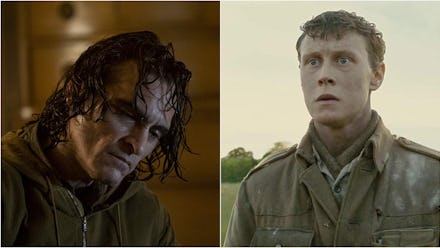I watched 'Joker' and '1917' in the same weekend and it nearly ruined me

As the days before the Oscars dwindled, I still hadn’t wracked up the nerve to watch a couple major awards contenders: Joker, which had 11 nominations going into the Academy Awards, and 1917, a runner-up with 10.
I’d been avoiding them for several reasons. Firstly, I resented all the accolades Joker was getting, when more interesting and complex “eat the rich” movies like Hustlers were being ignored. Secondly, films with tons of violence make me really anxious. I know a lot of people who hate scary movies for the same reason — it’s hard to justify spending two hours and upwards of $20 on “entertainment” that makes you feel rotten. Anyhow, I’d heard a lot of great things about 1917, but it’s a World War I epic, which meant people were gonna die gruesomely, and I was bound to cry about it.
Blergh. So, knowing that it’d behoove me, as a culture writer, to have seen these films before Sunday, I plunked myself down on the couch on Friday to scratch Joker off my list. (I receive awards screeners as a member of the Writers Guild of America and was grateful to be able to watch these at home.)
Listen guys, if the plot of Joker were any slower, it’d be moving backwards. Todd Phillips’ gritty retelling of the Batman villain’s origin story is so boring and one-note that it frankly doesn’t earn all the action and gore at its “climax.” From the very first scene, Arthur Fleck (Joaquin Phoenix) is a sad clown… and over the course of the movie, he slowly (so slowly) becomes an even sadder armed-and-dangerous clown.
There are haphazard stabs at social commentary. The scene between Arthur and his social worker — where he confronts her for not listening to him, she tells him their funding has been cut, and he’s left with no support or access to psychiatric meds — certainly takes aim at the bureaucracy for failing the poor and vulnerable. But the way the movie devolves into this broad, bloody proletariat uprising with the murderous Joker as its patron saint is so sloppy and obvious.
One thing about Joker that really amused me was how often the movie’s self-serious malaise devolved into comedic absurdity. No spoilers, but the scene after Arthur commits his first big murder — where he does a sad, interpretive clown dance in a public bathroom — was truly bonkers. Same with the part where he climbs into his own refrigerator. Absolutely drenched in ridiculous melancholy. I’ve simply gotta ask… Why so serious, Joker?
After 122 minutes of Joker, I felt angrier than ever that it was so lauded by Hollywood. I needed a break before I could stomach the trauma of 1917. About 36 hours (and a couple soothing yoga sessions) later, however, I was back on the couch and ready to face the war film that had good odds of cleaning up at the Oscars later.
Firstly, I’m grateful that I had a dog to hug for the duration of the movie. I needed that furry security blanket, because from its opening moments, 1917 is non-stop nerve-wracking action. Literally ten-ish minutes into the film, you’ve got the Hot Priest from Fleabag (Andrew Scott) telling the protagonists they’re definitely going to die, while arming them with some grenades and a flare gun. With every ominous swell of the score, I was sure Germans would leap from the shadows and gun down our boys. By the time awful stuff did happen my nerves were wrecked from the anticipation. I had to pause the movie a bunch of times to self-medicate with snacks and other recreational substances (another perk of watching this one at home). At several points, including when the credits rolled, I was openly sobbing.
Honestly, I’m not sure how people get through 1917 at the theater. It would’ve been the worst moviegoing experience ever. Relentless trauma for two hours, and by the time it’s through, you’re just a snotty, tear-drenched, puffy-eyed blob on the sticky theater floor. You expect me to go out in public after something like that?
To be fair, 1917 was a really good film, unlike Joker. The “real-time” cinematography was incredible, and the acting was luminous. The fact that director Sam Mendes wrote the script based on stories his grandfather, a World War I veteran, told him is truly special. It’s one of those stories Bong Joon Ho was talking about when he quoted Martin Scorsese at the Oscars last night: “The most personal is the most creative.” I really appreciated 1917 for its artistry, even though I wouldn’t call watching it an enjoyable experience.
After binging both films, I felt like I spent my weekend cramming for a particularly gruesome final exam. But that made Parasite’s sweeping victory at the Academy Awards last night all the sweeter: the film I’d seen and loved months ago — the one I couldn’t get out of my head, the one I longed to watch over and over again, the one I thought was hands-down better than the rest — actually took home the top prize. Looking back on it, I’m glad I saw Joker and 1917 before Parasite won its quartet of well-deserved awards. They offered that much more context, that much more evidence that Bong Joon Ho’s film is exceptional.